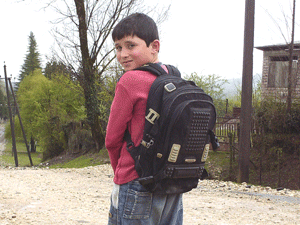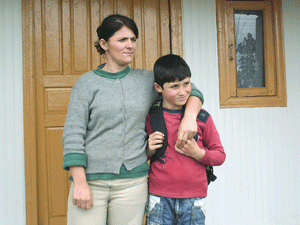 Nana Pazhava, Zugdidi
Nana Pazhava, Zugdidi
Giorgi Bendeliani dreams of being able to go to school. He is ten and has been deaf and dumb since birth. Two years ago he took lessons with the group of deaf and dumb children. However, a year later the district municipality stopped funding the lessons and the group was abolished. Giorgi was not accepted at the public school in his native village of Jikhashkari. The schoo’s administration stated there were special schools for similar children in Georgia and that he needed to go there to study.
Giorgi Bendeliani lives in the mountainous village of Jikhashkari in the Samegrelo region of West Georgia with his mother and grandmother. Both his mother and aunt are deaf and dumb from the birth as well. On top of their handicapping condition, the family is extremely poor. The only person who keeps the family, the grandmother, is often very ill. The cost for her treatment is more than they can afford and this makes the problem for the child even greater.
Despite poor social conditions the grandmother has somehow managed to take Giorgi to special tutorial courses from the village to the town. With the assistance of special teachers who are experienced with such special needs, the child had achieved some success. However, soon the special group was closed down for lack of funding.
The fact was a serious shock for Giorgi. The grandmother said that Giorgi is sleeping with school bag in expectation of going to school. When he sees children going to school on the road he grabs the school bag and runs after them.
Nutsa Kvaratskhelia, the grandmother: “Giorgi is a very clever child; he is eager to start learning. When he attended lessons at the special course the problem was partially resolved…now the boy is at is home and he is depressed. He really wants to go to school. He goes everywhere with his schoolbag despite the fact he needs it or not. He often remembers some of his class mates from the special group.. I do not know how to explain to him that he cannot continue going to school. It is just too complicated for his to understand about money and that they don’t want him in a regular school too. Now I was taking him to the dentist and he still is carrying his schoolbag. Yesterday, he put the bag on his chest and said he would die if he cannot go to the school….”
The grandmother worries about the situation mostly because she could not send her deaf-dumb daughters to school for the same reason. Although they studied at a special school in Tbilisi, they could not finish it because of their poverty and had to return home.
 Nutsa Kvaratskhelia, the grandmother: “Now I regret but at that time I could not live without them in the village. I don’t want to repeat the same mistake. I want him to study. Maybe somebody will advise me to take him to Kutaisi or Tbilisi special school. However, I just can’t afford the fees. On top of that I don’t want him to be separate from his family. Regardless, I cannot afford sending him to a special school far from home. What shall I do now if the school near here is not opened? What will happen with Giorgi and other children who are experiencing similar problems? They were left on the half-way of the education and it was just cut without warning.”
Nutsa Kvaratskhelia, the grandmother: “Now I regret but at that time I could not live without them in the village. I don’t want to repeat the same mistake. I want him to study. Maybe somebody will advise me to take him to Kutaisi or Tbilisi special school. However, I just can’t afford the fees. On top of that I don’t want him to be separate from his family. Regardless, I cannot afford sending him to a special school far from home. What shall I do now if the school near here is not opened? What will happen with Giorgi and other children who are experiencing similar problems? They were left on the half-way of the education and it was just cut without warning.”
Mimi Sarchimelia, former director of the Courses for Deaf and Dumb Children, does not want to comment on the situation. She is the only Surdo-Logopedist in Zugdidi.
The Human Rights Center found out that the local government paid only 400 GEL a month for the special school. Moreover, the teachers did not receive the final 800 GEL of their pay. Besides that, reportedly the director of the Kutaisi Special School acted negative role in closing down the Zugdidi School. He petitioned to the Georgian Ministry of Education and Science. Based on some rumors he wanted to attract fourteen children of the Zugdidi School to his own school. Despite the local government being actively involved in the abolishment of the school parents refuse to believe what appear to be the facts of the school’s closing.
Members of the Association “Dea” for Disabled Woman and Mothers of Disabled Children consider that a special school or classes should be established for such children. Consequently, it would be easier for them to go to ordinary public school afterwards.
Madona Kharebava, Executive Director of the “Dea”: “Ordinary public schools should have the system for inclusive of disabled children in the least restrictive environment. Only teachers and school administration are unable to resolve the problem. A psychologist and a teacher specially trained in the field should be employed in such schools. This problem is connected with both human and financial resources. It would be impossible to change this situation in a short period of time. However, we should strive to move from one point to the next with as little pain as possible. It is not necessary to abolish special courses or schools all at once.”
Since Giorgi Bendeliani was not accepted to the Public School of his native village the NGO “Dea” became involved in the case. A short time ago they got in touch with the Ministry of Education and Science. As a result the Education Resource Centre of the Zugdidi Municipality and the administration of the Jikhashkari Public School received recommendations regarding the acceptance of Giorgi Bendeliani at school.
Madona Kharebava: “Girogi might be able to attend school in the near future. But the problem is still unresolved. Although the government has assumed the responsibilities of establishing inclusive studies before 2015 throughout Georgia Public Schools there is still no real action to make this a reality. There is no date set as when we can expect pilot schools to open. As it stand now they are not ready to accept and teach disabled pupils. However, Giorgi’s attendance to lessons will have been a unilateral function, as he will now be integrated. Such inclusion is very important for normal development. Regardless, he still will be able to obtain the minimal education. Perhaps it would have been possible if were trained to teach similar children and how to provide inclusive lessons for a range of students.”
The Human Rights Center considers that in the case of Giorgi Bendeliani Georgian Civil Law on General Education, Article 9, paragraphs 1, 2, 3, and 6 are breached as well as several articles of the International Convention of the Rights of Child. Every child has right to study at the school near his/her place of residence and the government and society are required to assist a student in getting an education in the least restricted environment.
Nino Kufunia, a lawyer: “it is violation of the right to education that is guaranteed by the Georgian Constitution, the Law on General Education and International Documents and Acts, which are ratified by Georgia.”
News
December 13, 2023
Ethnic minorities outside the peace dialogue
November 6, 2023
‘Peace’ agenda of political parties
Popular
Articles
February 13, 2024



